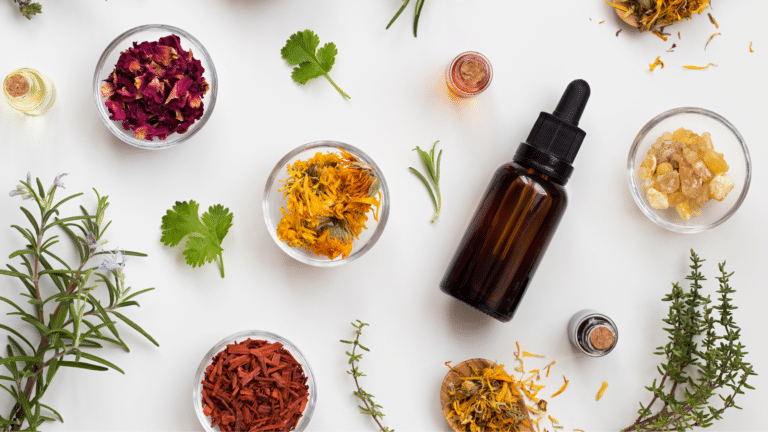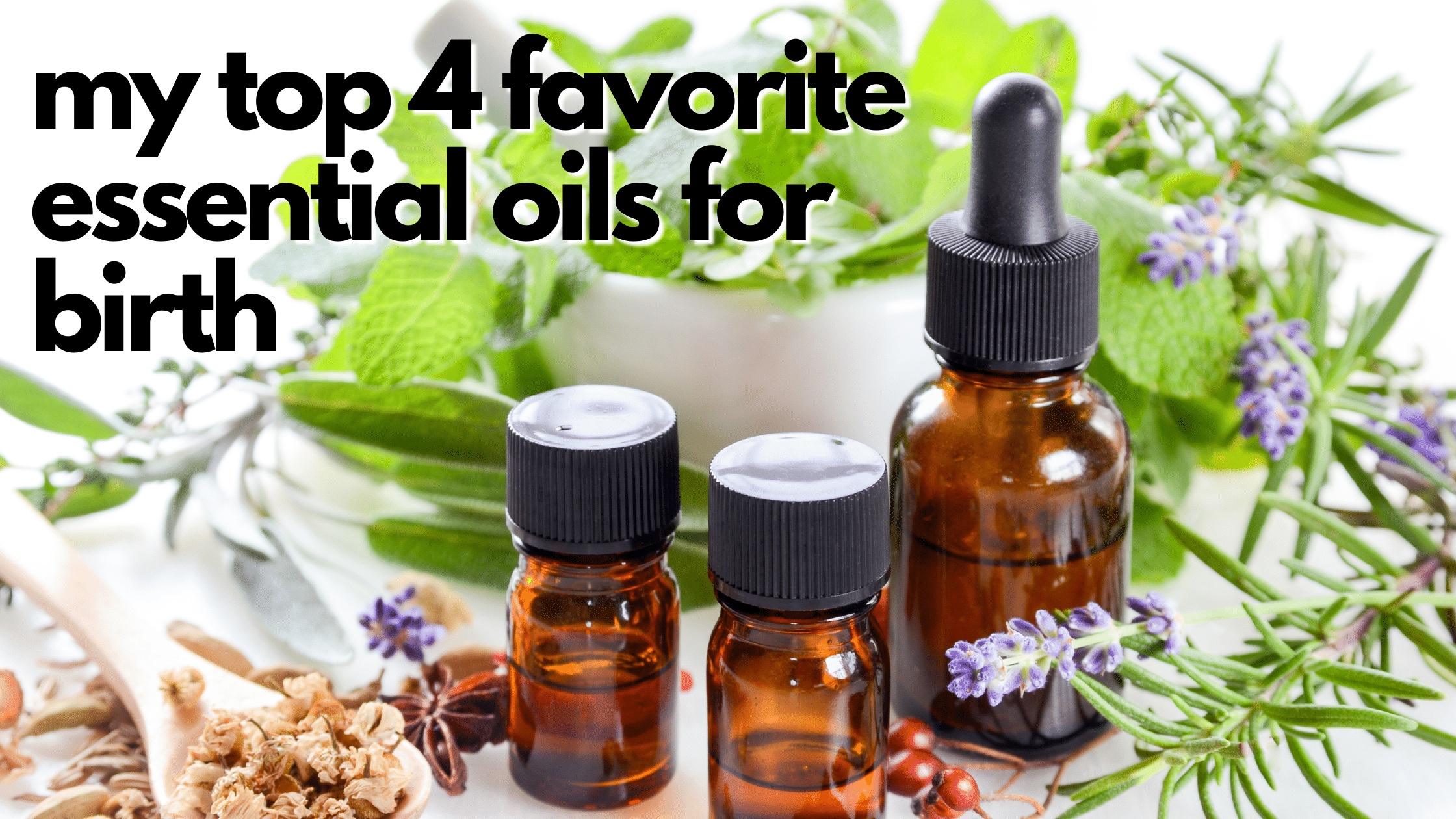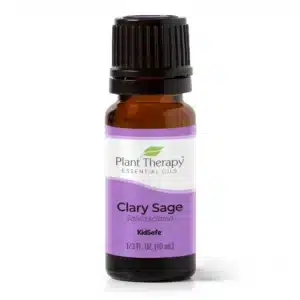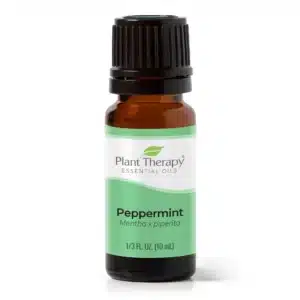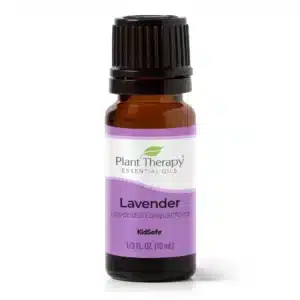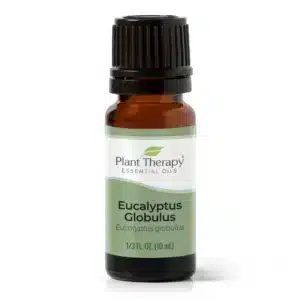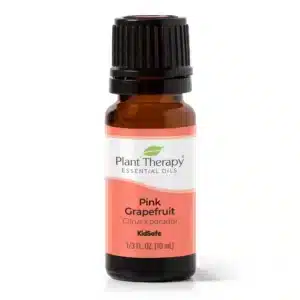As an OKC Doula, student midwife, and midwifery assistant, I use essential oils for labor because they can be powerful tools. There is evidence from several different studies that suggest that aromatherapy can help in relieving anxiety and pain during labor for laboring parents. If you are interested in reading these studies, I have listed several resources below.
Disclosure: Some of the links below are affiliate links. This means that, at zero cost to you, I will earn an affiliate commission if you click through the link and finalize a purchase.
What Is Aromatherapy?
Aromatherapy for childbirth uses therapeutic-grade essential oils extracted from aromatic herbs, flowers, and trees. There is a good chance you have a friend or family member who diffuses oils or wears them! They have gained massive popularity over the last several years, yet humans have used odiferous plants, flowers, and roots in oils for several millennia. You can diffuse certain essential oils during birth, add them to a carrier oil, and wear them on your skin. Before labor, it is crucial to ensure that essential oils don’t bother your skin or body. Certain essential oils are better for wearing with a carrier oil than for diffusing with a diffuser.
The Development Of Essential Oils.
The first records of essential oils come from ancient India, Persia, and Egypt. The countries of Greece and Rome did extensive trading with Asian countries for odoriferous oils and ointments. During this time period, flowers, roots, and leaves were placed in fatty oils to create the oils, resins, & ointments.
The distillation of essential oils was developed in the golden age of the Arab culture. The Arabs were the first to distill ethyl alcohol from fermented sugar, thus providing a new solvent for the extraction of essential oils in place of the fatty oils that had probably been used for several millennia. We can thank the Arab Golden Age for the modern essential oils we use today!
How Helpful Are Essential Oils For Labor?
There are many researchers all around the world who have been studying the effects of essential oils on the human body as well as essential oils for labor. From reducing the stress hormone Cortisol to increasing the hormone Oxytocin and providing relaxation and muscle tension release, essential oils have numerous benefits! For instance, anxiety stimulates the sympathetic nervous system. It releases stress-related hormones such as noradrenaline, cortisol, and adrenaline, which increases how people feel the severity of labor pain as well as the duration of labor (Lowe). The calming effects of essential oils can be a helpful tool in labor pain management. For parents preparing for an unmedicated birth, using essential oils and other tools like massage can be a great pain management alternative to medications.
By using essential oils for labor, we can find a way to provide pain relief feeling and relaxation with minimum complications. Birth workers such as myself can make a significantly positive impact on a family’s labor and birth journey.
my top 5 favorite essential oils for Labor and birth
clary sage
As a birth doula, Clary Sage is one of my favorite essential oils for labor. I have utilized the Clary sage essential oil and acupressure to encourage labor during client inductions or if labor ‘stalls’. Clary Sage essential oil contains sclareol which has an estrogen-like effect because sclareol has a structure similar to estrogen (Tisserand).
You may be able to use clary sage to induce labor. Since the hormone estrogen encourages the release of oxytocin, the sclareol in clary sage can also encourage a more significant release of oxytocin. Commonly, inductions use a synthetic form of oxytocin in an attempt to start labor, called Pitocin. Clary Sage oil is a more ‘natural’ way to encourage labor, but it can also be combined with typical hospital induction methods.
Clary Sage Reduces Cortisol
Studies also show that inhaling clary sage reduces cortisol levels (Tadokoro). Cortisol is your body’s primary stress hormone and is made in the adrenal glands. This hormone becomes elevated when we experience heightened anxiety or stress but lowers when we’re relaxed. You can imagine how important it is not to have stress hormones flooding your body when working to bring your baby into the world.
Evidence suggests that when someone increases cortisol, their birth can become stalled. This is because, as animals, we need to be able to access our fight or flight response in case we are birthing and a predator or some other danger occurs.
As a birth doula, preventing my doula families from entering the fear-pain cycle and experiencing an increase in cortisol is a high priority. I utilize essential oils for labor, like Clary Sage to do this.
Peppermint
Peppermint oil is extracted from the peppermint plant’s stem, leaves, and flowers. So far in my journey as a birth doula, peppermint is one of my most commonly used essential oils for birth. During labor and birth, there are huge changes in hormone levels which can leave people feeling pretty nauseous. Putting a drop or two of peppermint oil on a cotton ball and taking slow, deep inhalations can help alleviate this feeling of nausea. When battling first-trimester nausea, parents can use a mint lotion for pregnancy. Parents can apply the lotion to their hands and breathe slowly to help relieve nausea.
I have also used a single drop of peppermint essential oil and eucalyptus oil for my clients during foot massages during lengthy inductions. Induction of birth can cause a lot of swelling for the parent because of the long-term use of IV fluids. Massages with eucalyptus and a small amount of peppermint have helped my clients reduce this swelling in labor.
That said, “Peppermint oil has been used to trigger menstruation and should be avoided during pregnancy. Peppermint oil should not be used internally or on or near the face in infants and young children because of its potential to cause bronchospasm, tongue spasms, and, possibly, respiratory arrest (Kliger)”. Several commonly used essential oils should NOT be used around children. Eucalyptus and Peppermint are among them.
Lavender
One reason that I really enjoy using Lavender essential oils for labor is that is has been shown that massage with lavender significantly reduces the pain intensity compared to massage without essential oils. (Lamadah). If a client feels comfortable with massage as labor comfort technique, we can add a little more power behind the massage with lavender oil!
How does lavender essential oil alleviate pain?
The lavender essential oil has the most research done on it compared to other essential oils. One study showed that inhalation of lavender essential oil significantly decreased pain intensity during labor (Yazdkhasti & Pirak). While another study indicated that aromatherapy with lavender essential oil significantly decreases pain intensity during labor (Yazdkhasti). Lavender (L. Augustifolia) is often used to treat insomnia during pregnancy through aromatherapy using essential oils or herbal teas and supplements (Ramadhani).
Lavender is high in esters, which are calming and sedating to the nerves and smooth muscles. Our olfactory system picks up the lavender smells and sends that message to our brain, encouraging our body to relax and release muscle tension.
Learn more about using Lavender during pregnancy by reading my blog, How to Use Lavender for Pregnancy.
Eucalyptus
Eucalyptus is one of my top favorite smells, personally! I love using it at births if my clients consent to using it! Studies show that Eucalyptus oil has analgesic effects and anti-inflammatory properties (Silvia). Analgesic’s are agents that reduce the sensation of pain. This can be pretty handy for labor as you can imagine!
Previously, I have used Eucalyptus essential oils for labor for massage and to create calming baths for clients. Just a drop or two in a warm bath can help relax the hard-working muscles during labor. This relaxation can reduce levels of the stress hormone cortisol and give a little boost of oxytocin. So while a client is relaxing peacefully and managing their labor in the warm waters of a bathtub, they can also encourage labor’s progression. As a note, I have not used eucalyptus oil in a bathtub or birth pool if the parents are planning on their baby being born in said tub or pool.
Is eucalyptus Oil safe for pregnancy?
Eucalyptus is safe to use in pregnancy (Ramadhani) and can be used to aid cold symptoms. Parents in Africa use Eucalyptus during pregnancy to treat common cold symptoms. I love using eucalyptus during labor for my doula clients to help reduce swelling from birth. As always, parents should use caution using any oil in large quantities during pregnancy.
5. Grapefruit
“When you are feeling drained, strung out, and depressed, grapefruit provides a new zest for life. With its light, fruity aroma, it gives wings to feelings of heaviness, uplifts sagging spirits and radiates optimism.” – Robbie Zeck.
Last but not least, we have Grapefruit oil! Citrus oils like Grapefruit oil is expressed from the peels of the grapefruit. You have probably smelled the oil of a grapefruit when peeling a fresh grapefruit and are familiar with its bright, citrusy smell. I enjoy using grapefruit essential oils for labor to alleviate nausea and to uplift a doula family’s spirit.
I enjoy using grapefruit oil when supporting hospital births as a doula because it can make the hospital room’s smell disappear and help create an uplifting birth space. Grapefruit oil does more than smell good, though! Studies show that grapefruit oil is an antidepressant, antiseptic, depurative, disinfectant, diuretic, hepatoprotective, stimulant, powerful antibacterial, and anti-fungal. “Grapefruit oil was tested on methicillin-resistant Staphylococcus aureus (MRSA) and methicillin-sensitive S. aureus (MSSA) from hospital patients using the disk diffusion method.
Grapefruit oil showed higher effectiveness in inhibiting MRSA and MSSA growth than vancomycin, the currently used standard antibiotic for treatment. The authors concluded that essential oils such as grapefruit could be beneficial in treating hospital patients with MRSA and MSSA infections in areas where antibiotics are not readily available (Sharma). How incredible is that?!
